
50th Anniversary: School of Nursing honors past, embraces future of healthcare
February 27, 2023

February 27, 2023
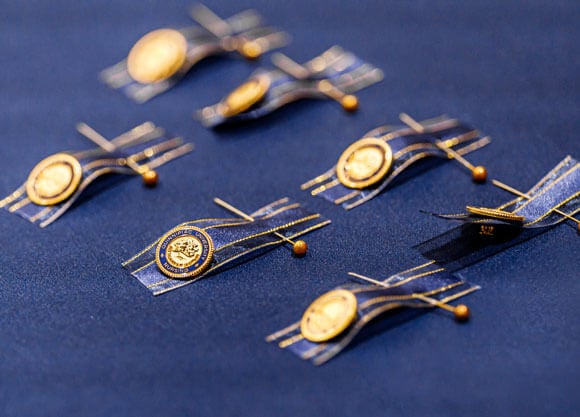
The 18 nursing pioneers led the way for more than 4,500 Quinnipiac nursing alumni who continue to impact health care and the lives of patients, families and communities worldwide.
“This milestone has provided an opportunity for us to pause and consider our journey as a nursing program,” said Dean Lisa O’Connor. “The School of Nursing has grown beyond direct nursing preparation to become an innovator in fostering organizational leaders, impactful research and quality improvements in healthcare.”
This April, the School of Nursing will formally celebrate the 50th anniversary of its first graduating class with an experiential showcase celebration on April 13 at its North Haven Campus. The event will be the culmination of a yearlong tribute that began with an evening reception and sparkling cider toast during Bobcat Weekend in September.
“Our graduates are leaders at every level of the healthcare system and continue to facilitate positive changes to the practice of nursing as it relates to patient care, quality improvements, research, education, government and law,” said Associate Dean Lisa Rebeschi. “Our history has equipped us well to meet the current and future challenges facing today’s nursing industry as we advance through the next 50 years.”
Today, the Quinnipiac nursing community includes faculty leaders, clinicians, scholars, healthcare partners and researchers, overseeing an enrollment of just over 1,100 students across ten programs spanning bachelor’s, master’s and doctorate degrees.
Throughout the past 50 years, the School of Nursing has remained steadfast in its framework of three pillars -- holism, interprofessionalism and inclusivity -- which are incorporated into the curriculum, scholarship, teaching and service activities. It is those established principles that provide the foundation for growth and development of Quinnipiac’s School of Nursing.
When Jean Inge Hairston ’72 first arrived at Quinnipiac in 1970, she wasn’t sure what to think of the small, quiet campus with only a few buildings. Her doubts only deepened when she was directed to a small trailer that served as the administrative office for the new natural sciences program. But after a warm greeting and personal meeting with Nursing Program Director Helen Webster, she knew one thing for sure, this was a program that wanted every student to succeed.
Her career as a professional nurse spanned more than 40 years and led her to a fulfilling position in the college health service settings where she provided care for students from all over the world, including faculty and staff members. She retired from the State of Connecticut Department of Mental Health and Addiction Services in 2015.
“I have had the good fortune to practice in various healthcare settings, but there were many challenges along the way,” said Inge. “Nursing is a responsible and challenging profession, but it is also one which provides many opportunities to experience unlimited areas of health care.”
When she thinks back to those early days, Inge credits her time at Quinnipiac for providing the foundational support she needed to pursue a career of impact.
During the early 1970s, African American nurses were often absent from key leadership roles within the profession of nursing. At that time, Inge didn’t realize the historical significance of her position in the inaugural class of nursing students at then Quinnipiac College. But today, hindsight has provided an opportunity to reflect on her role, and Quinnipiac’s influence, on opening doors for future generations to follow.
“I chose Quinnipiac because many hospital nursing programs in 1970 were not likely to accept Black applicants,” said Inge. “After the hard work to complete the program, I remember listening to our commencement keynote speaker Judge Constance Baker Motley. Her message was inspiring, and it gave me hope that I could find success as a professional nurse, unlike my parents who did not have the same opportunities I had at my age.”

Constance Baker Motley became the first African American woman appointed to the federal judiciary on January 25, 1966. Her commencement address to Quinnipiac’s graduates still resonates with Inge today, who continues to support the university with the establishment of the Hairston Family Scholarship Fund in 2015, providing financial aid to undergraduate Black, African American and minority nursing students.
“I wanted to shine a light on the path so other Black nurses may have the opportunity to achieve a Quinnipiac education like me,” said Inge. “That’s why I’ve continued to support Quinnipiac these past 50 years because I know personally that it is an institution that promotes diversity and inclusivity.”
It is that same commitment to provide the best possible training and education for the next generation of students that continues to fuel School of Nursing faculty and staff members today.
As a nursing student, Mary Ann Urban Cordeau AS ’77, AS ’81, BSN ’83, remembers she was sitting in a semi-circle with her classmates around instructor Grace Shafer when it slowly began to dawn on her. She wanted to commit her healthcare career to the education of nursing students.
“My educational experience at Quinnipiac, both in cytotechnology and in the nursing program were wonderful experiences. Simply put, I had really good instructors,” said Cordeau. “To this day, I still remember the things Dr. Jane Bower taught me. She was so passionate about teaching and about her subject that it inspired other people to learn and do their best. I wanted to do the same for other students.”
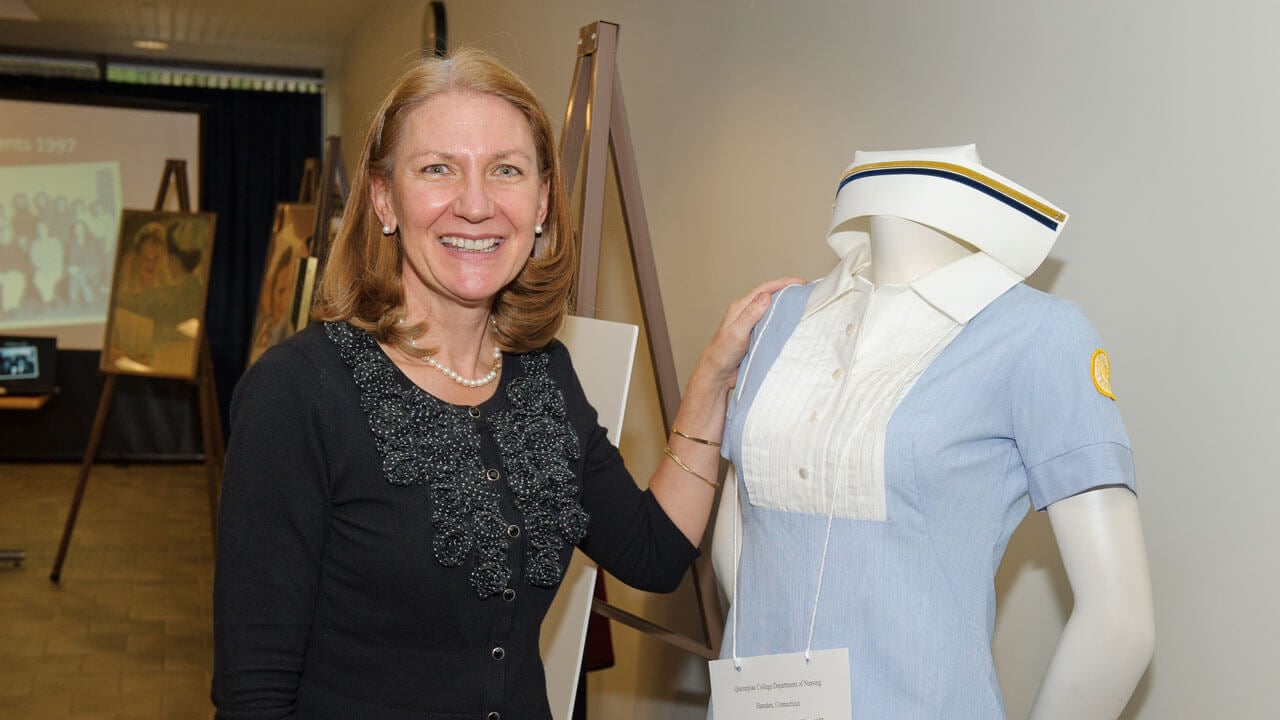
Cordeau’s Quinnipiac education includes earning two associate degrees in cytotechnology and nursing as well as her bachelor’s in nursing. She officially joined the Quinnipiac faculty in 2006 and dedicated her expertise to the development of evidence-based simulation educational practices.
Her work embodies the School of Nursing’s founding commitment to interprofessional collaboration as a cornerstone of its curriculum and skill development. Named a Quinnipiac associate professor emerita faculty member, Cordeau’s teaching career encompasses more than 25 years. Among her accomplishments, she was instrumental in the implementation of the nursing simulation program and spearheaded the design of North Haven’s state-of-the-art simulation suites, a hallmark of today’s Schools of Nursing, Medicine and Health Sciences.
What began with the use of high-fidelity simulation manikins and written scripts in 2007 has grown to encompass a full array of health assessment and skills laboratories along with high-fidelity simulation suites, that include operating rooms and multiple advanced adult, pediatric and neonatal manikins used to represent various stages of care and need.
“Simulation has been used in nursing education for more than 100 years,” said Cordeau. “Over the years, simulation has evolved and improved with technology to the point where it promotes the acquisition of the knowledge and skills necessary to meet the holistic care needs of our patients.”
Led by the nursing laboratory and simulation team, the Medicine, Nursing and Health Sciences Simulation Program was recently awarded accreditation in the area of Teaching/Education by the Society for Simulation in Healthcare. This achievement highlights the school’s ongoing commitment to modeling interprofessional health education.
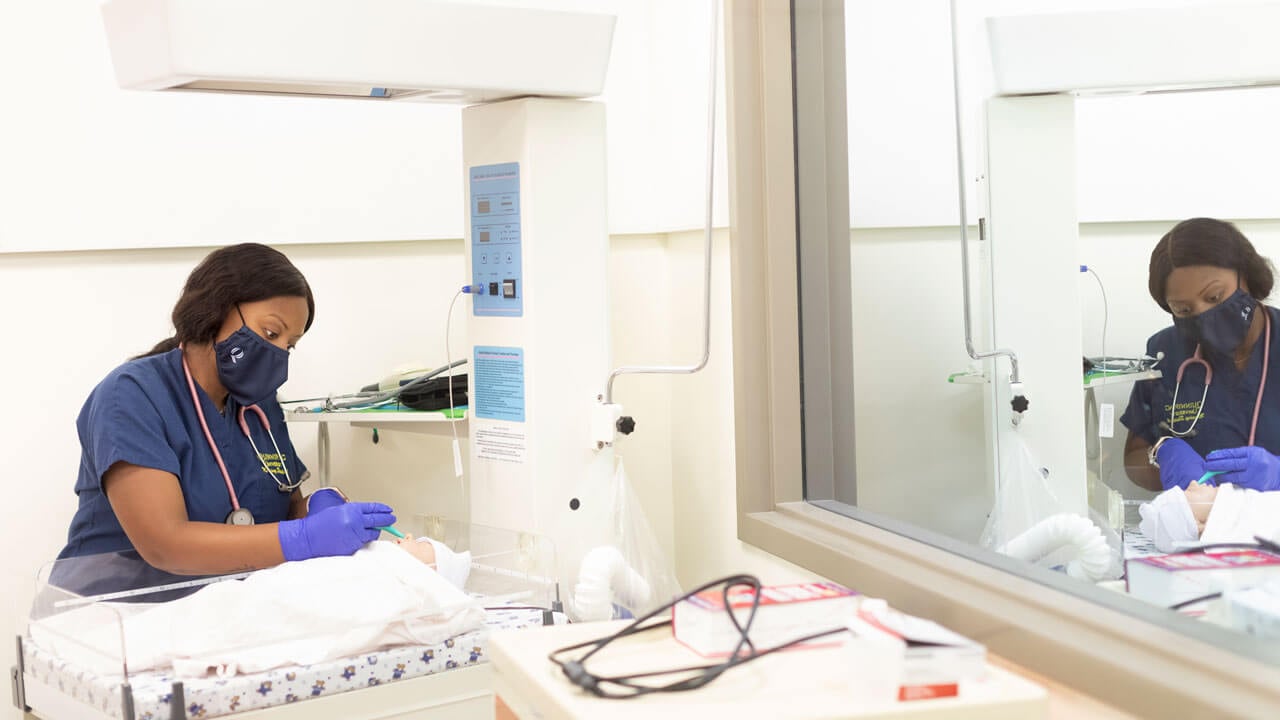
Quinnipiac’s nursing program has been interprofessional from its start as a department within health sciences, with faculty working alongside members of the biology, chemistry and physics departments in its early formative years.
“From the beginning, we’ve always had very close ties with the members of the health science department. I think that was wonderful because every time we dealt with creating initiatives such as a new degree program, it would involve input from all of the basic sciences,” said Joe Woods, former dean of the School of Health Sciences from 1987 to 2005. “We had long been an associate degree program, but when I became dean, we began to work toward converting the associate program into a bachelor's nursing program. I believed in the work we were doing so much, that my daughter Alisa became a 1995 graduate of our first bachelor’s nursing class.”
The evolution of the School of Nursing grew to include a statewide reputation and a burgeoning network of clinical partnerships to support the goal of interprofessional collaboration beyond Quinnipiac’s campus community.
“From day one when I set foot on this campus, I learned the true meaning of the word ‘team.’ Our team was everyone, from the faculty to facilities and secretaries to our support personnel in the library and student health center. They were all part of the team,” said Woods. “We started out in the early 1970s with few outside clinical partners. But those partnerships quickly increased as our reputation grew from programs such as the diagnostic imaging and radiologic sciences.”
That list of community partners now includes more than 300+ clinical affiliations including hospitals, clinics, rehabilitation centers and other healthcare settings, as well as new groundbreaking programs designed with Hartford HealthCare and the Yale New Haven Health System. Through this network of medical partners, students are fully immersed in the integrated practice of holistic care through ongoing clinical experience and research.
“By focusing on the development of interprofessional communication skills between medical departments and clinical partners, our students are learning to respond to the medical and psychosocial needs of their patients, their families and other members of the healthcare team,” said Cordeau. “Our interprofessional simulation labs and steadfast commitment to holistic care are exactly what sets us apart.”
As the nursing industry transitioned from traditional nurses’ caps and clipboards to scrubs and electronic health records, the Quinnipiac nursing program continued to prove its agility.
During the early 2000s, the program outgrew its Mt. Carmel Echlin Health Sciences home and, in 2009, made the landmark move to its current North Haven facilities as a part of the School of Health Sciences.
In 2011, the program became a formal School of Nursing under the leadership of its founding dean, Jean Lange.
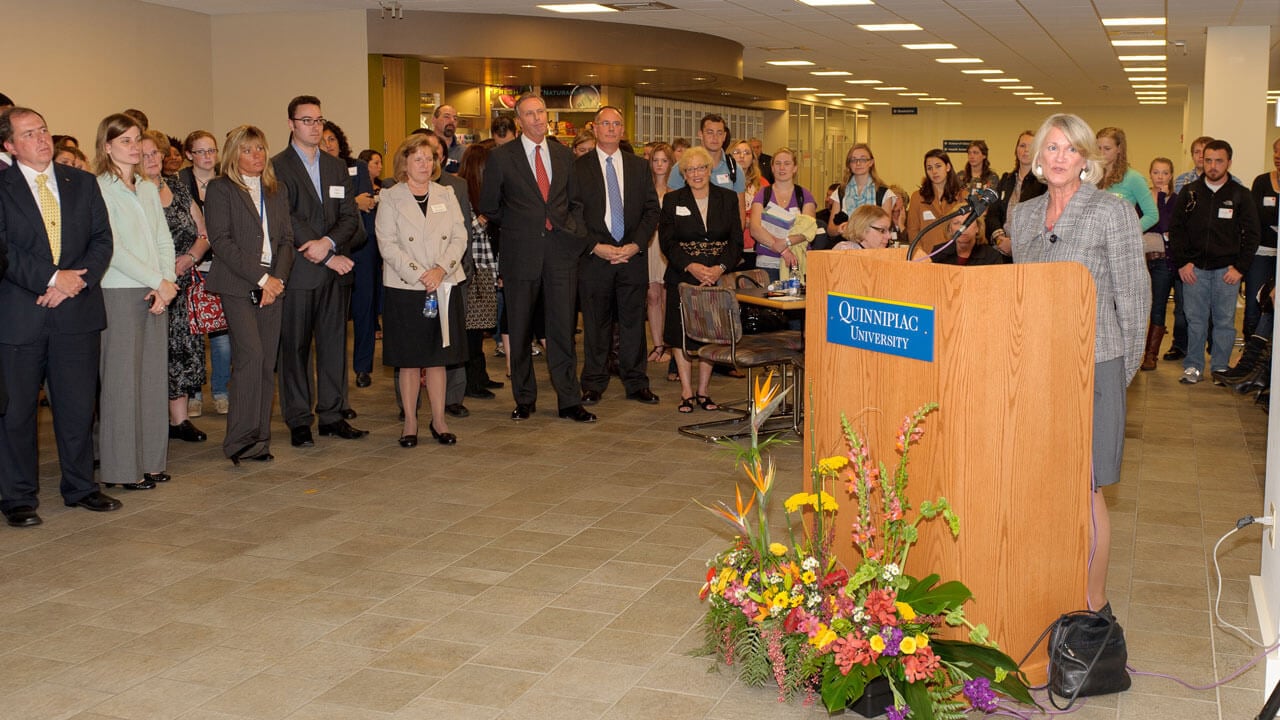
Developments included new programming that anticipated industry needs and utilized the latest in technologies, the launch of four doctoral programs and the school’s first online RN to BSN program in 2013, followed by the online MSN program in 2016. Lange was named dean emeritus upon her retirement in 2018.
Taking the helm as the school’s second dean, O’Connor has guided the School of Nursing through new initiatives, program milestones and a worldwide pandemic with Quinnipiac faculty, staff, students and alumni serving on the front lines of the response. Program development is tied directly to national and industry needs. Faced with an aging population who is living longer and the growing concern over mental health care, new courses include the Adult-Gerontology Acute Care Nurse Practitioner program and the development of the psychiatric mental health nurse practitioner program, currently in the design phase.
Today, with a team of more than 200 full and part-time faculty and staff members, the School of Nursing is considered a state leader in nursing leadership development. In 2022, the university-wide partnership with Hartford HealthCare was established to focus on growing student pipelines across a wide range of industries to address long-term talent needs for the state and beyond. In addition, the launch of the new Yale New Haven Health System program supports Quinnipiac’s accelerated BSN program for second-degree students to help address nursing shortages affecting the industry.
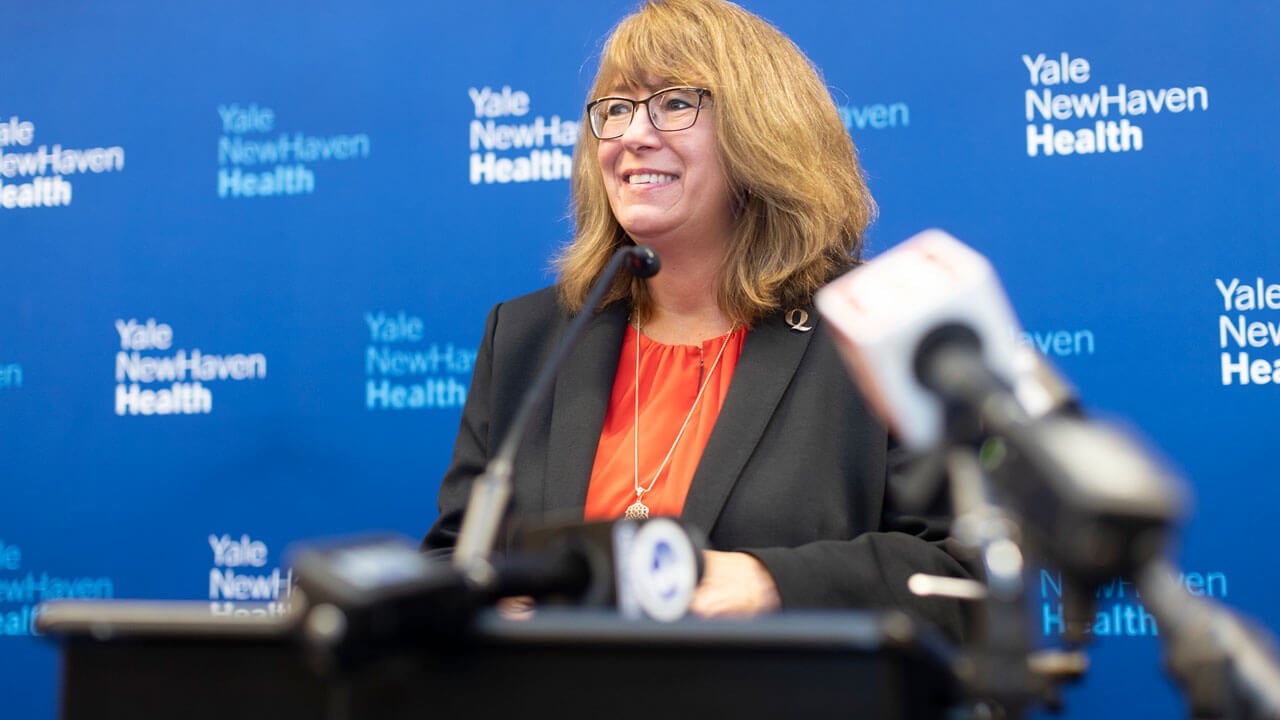
The School of Nursing programs of today combine classroom, lab, simulation and clinical experiences to teach students how to deliver whole-person care.
“While the industry may have changed, the School of Nursing’s focus has never wavered from its goal to develop leaders who are experts in patient care, policymaking and research initiatives,” said O’Connor. “These new initiatives ensure that all of our nursing students have the resources and hands-on training they need to excel before and after graduation as we continue to prepare future generations of care providers”
It was a tour of the university’s high-fidelity simulation suites that first attracted Charles Sharkey BSN, RN ’21 and Morgan Literate BSN, RN ’21 to Quinnipiac’s School of Nursing. But it was the sense of community and holistic approach to care that made them stay.
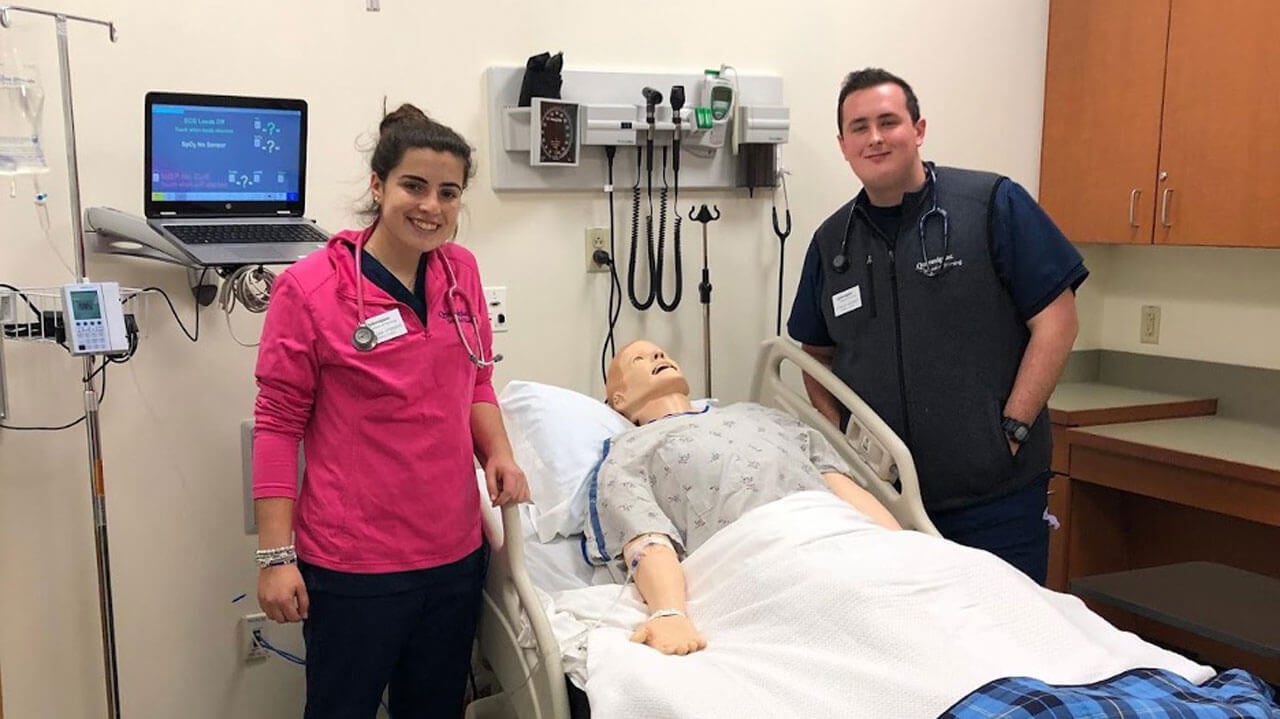
The couple met their first year as participants in the Nursing Living Learning Community and are engaged to be married in 2024.
“We both chose to attend Quinnipiac University because of the simulation rooms, clinical experience opportunities, and holistically endorsed nursing education programs,” said Literate, referring to the fact that the School of Nursing is one of only 16 schools nationwide with graduate and undergraduate programs endorsed by the American Holistic Nurses Association.
“What we didn’t expect were the long-lasting connections we formed with our faculty, staff and classmates. That support was critical. We still actively communicate together and hang out regularly.”
Living in New Jersey, Literate is a nurse at Robert Wood Johnson Children’s Specialized Hospital where she provides care and rehabilitation services for infants who have been ventilated. Her inspiration to become a nurse is deeply rooted in her experience as a young girl watching her mother battle an aggressive form of breast cancer. As her mom struggled with cancer treatments, Literate found comfort and strength in the nurses who were committed to fighting alongside her.
“They made an impression on me. I remember the healthcare team was really in her corner and that inspired me to be like them,” said Literate. “I went into nursing because I wanted to work a job where I felt like I was making a difference.”
Literate made the most of her time at Quinnipiac and served in leadership positions in the Relay for Life and Kappa Delta Sorority and was the commencement speaker for the 2021 graduation ceremony.
During his time at Quinnipiac, Sharkey was a founding member, lieutenant and lead EMT for the Quinnipiac University EMS, the student-run, state-certified supplemental first responder agency. He was also the recipient of the Trewin Award for Professional Leadership in Nursing. Today he serves in the emergency department at Saint Peter’s University Hospital, where he is utilizing his interprofessional communication skills and holistic training for the benefit of others.
“I care for and treat all types of medical and trauma emergencies that enter the ER via 911 ambulances or walk-ups into the emergency department,” said Sharkey. “I love that each day is different and as an Emergency Room nurse, I have a lot of autonomy when it comes to ordering and initiating life-saving interventions.”
Both Literate and Sharkey credit their School of Nursing faculty members for guiding them to pursue their passions and obtain leadership opportunities in nursing. Through their training, they are able to provide the best care for their patients by understanding their physical, socioeconomic and emotional needs, while also navigating the 21st-century healthcare environment through collaboration with other medical teams.
While current challenges may be greater than the School of Nursing program founders could have ever imagined, today’s Quinnipiac nursing students share the same ambitions as their fellow Class of 1972 pioneers. They have all heard the call to serve.
“I chose the nursing profession after being involved in EMS since I was 16 years old. I loved being able to connect with people allowing me to empower and support patients and families through the ‘worst day of their life,’” said Sharkey. “Nursing has still allowed me to continue being the light to help guide others in time of need or help put some nerves at ease. Being that person makes the nursing profession 100% worth it.”
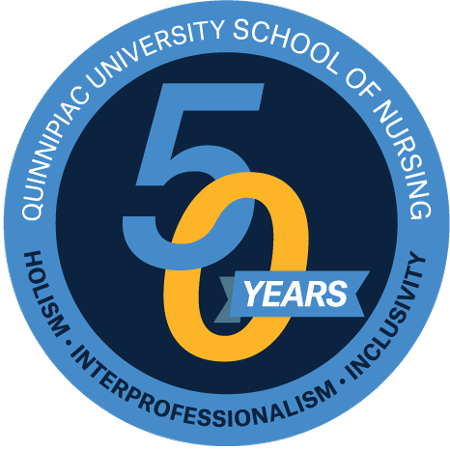
Come back and join us in celebrating our 50-year anniversary! Reconnect with fellow classmates, faculty and staff and observe how the latest in innovative technology is preparing students for the future of nursing.
Thursday, April 13, 2023 from 4 p.m. - 7 p.m.
370 Bassett Road, North Haven, CT 06473
Registration includes appetizers, beer, wine, champagne toast and a commemorative gift.
Quinnipiac Today is your source for what's happening throughout #BobcatNation. Sign up for our weekly email newsletter to be among the first to know about news, events and members of our Bobcat family who are making a positive difference in our world.
Sign Up Now